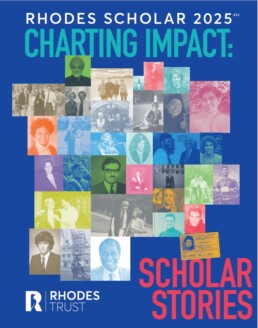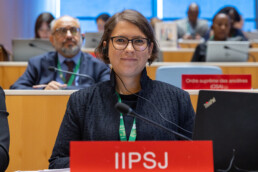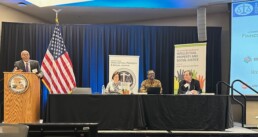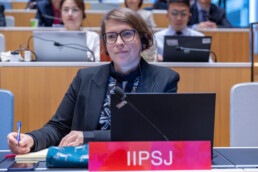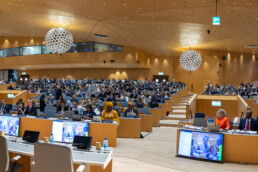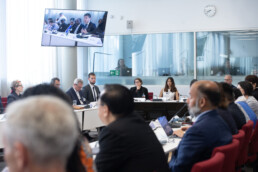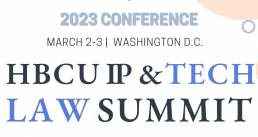Blog Post: Rhodes Scholar Magazine Highlights IIPSJ
Rhodes Scholar Magazine recently featured the subject of intellectual property and social justice in an article by IIPSJ Board Vice-Chair, Ron Katz.
This article first appeared in the 2025 edition of the Rhodes Scholar annual magazine.
Blog Post: IIPSJ Attendance at the 66th World Intellectual Property Organization General Assemblies
(WIPO GA) (Geneva, 8-17 July 2025)
By Dr. Metka Potočnik (she/her/hers), Senior Lecturer in Law, Wolverhampton Law School
IIPSJ attended the 66th World Intellectual Property Organization (WIPO) General Assemblies (GA), in their capacity as the WIPO Accredited Observer. Now attending in person for the third year in a row, IIPSJ participated in the official hearings at the WIPO Headquarters in Geneva, with the Associate Director for International Programmes, Dr Metka Potočnik, attending the length of the proceedings in person. These assemblies brought together another record number of delegates (over 1,600), from 194 Member States. All sessions are available for viewing here. The opening address of the Director General Tang, can be found here.
IIPSJ attended the GA sessions for the third time in Geneva, after having observed several WIPO meetings online, since 2020. IIPSJ continues to take the GA meetings as an opportunity to build strategic partnerships with Member States and other stakeholders, interested in creating access, inclusion and empowerment for under-represented creators and innovators in the global eco-system. IIPSJ contributed to the discussion in writing (contact us for the full statement, which will be included in the GA report), and in the session (view here, at 00:43:51, or here).
The content of our statement, in particular our emphasis of the UN Sustainable Development Goals, was also reflected in the discussions among Member States during the Programme and Budget Committee. What we have seen since the beginning of 2025 is a change in the context of discussions at WIPO, especially Agenda #11 (see here). Among other proposals, the United States asked for the “Removal of all references to the 2030 Agenda for Sustainable Development and SDGs from the Proposed Program of Work and Budget for 2026/2027” (A/66/7, page 11, Agenda #9, paragraph 3(i), see here), together with a reduction, or deletion of the Development Acceleration Fund. After two weeks of informal negotiations, all Member States approved the PBC on Thursday, 17 July 2025 (final day), without the deletion of the UN SDGs from the Proposed Program of Work and Budget for the upcoming biennial. The US delegation did not want to stand in the way of adopting the PBC by consensus but put their strong objections to WIPO’s continued references to the implementation of the UN SDGs, across their work and programmes on the record.
IIPSJ representative, Dr Metka Potočnik, also attended the 12th WIPO-NGO Stakeholder Dialogue, which was organised in parallel with the 66th WIPO GA and took place on Friday, 11 July 2025, at the WIPO New Building. WIPO Director General Darren Tang, Assistant Director Edward Kwakwa and Assistant Director General Andrew Staines, and other WIPO experts met with sixty-eight Accredited Observers and NGOs “to exchange views and strengthen engagement with the global intellectual property (IP) system.” According to DG Tang, when counting the Observers as well, the number rises to 1,800 delegates of the 66th GA session. The event has been placed in the spotlight for its importance and more can be read here.
WIPO also launched its Institutional Capacity Framework (ICF), which will be ‘a health check tool’ for universities and research institutions, aimed at fostering innovation. ADG Marco Aleman acknowledged that universities and research institutions are environments where innovation happens. Research organisations will be able to use ICF (on voluntary basis) to create growth, facilitate policymaking and build dialogue. Professor Fazilet Vardar introduced the ICF in more detail. ICF combines Knowledge and Technology (K/TT) Metrics to assess seven core capability dimensions: (1) leadership and governance, (2) organisational capacity, (3) institutional culture, (4) infrastructure, (5) transfer mechanisms, (6) stakeholder engagement, and (7) monitoring and learning. The tool will be general in nature and include research from all fields (STEM, social sciences, or the arts) and aims to cover the needs from organisations, which are only starting in research, and the needs of larger universities, well-established in world-leading research. The tool is still under development and its publication still pending. If you are with a research institution or a university and want to help WIPO develop the ICF (either at the stage of proof of concept by the end of 2025, or in the pilot stage, taking place in early 2026), please do get in touch with us, and we will connect you with the relevant WIPO team.
IIPSJ is continues to contribute to future discussions in WIPO, with the aim of building a more inclusive WIPO eco-system. The IIPSJ team are working towards a meaningful participation in the 47th Session of the Standing Committee on Copyright and Related Rights (SCCRR) (see here, 2026 dates to be confirmed) and the 35th Session of the Committee on Development and Intellectual Property (CDIP) (see here). Going forward, the IIPSJ also plans to expand its activities to the work of the Advisory Committee on Enforcement (ACE) (see here), in particular in the field of IP arbitration and mediation. If you are interested in contributing to IIPSJ work in this space, do contact the IIPSJ directly.
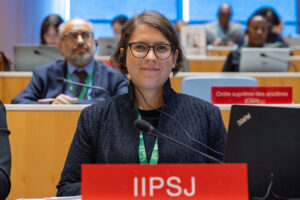
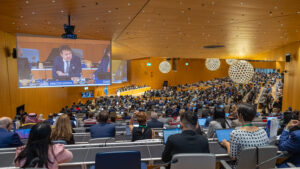
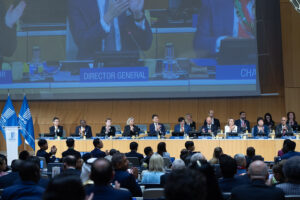
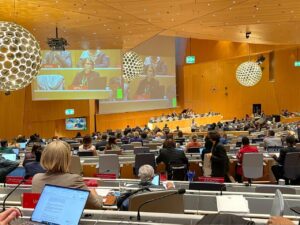
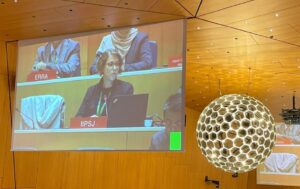
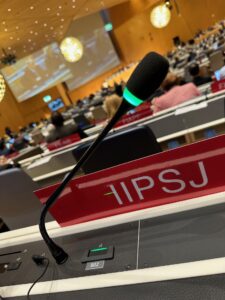
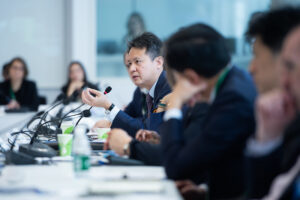
Blog Post: The White House Initiative to Promote Excellence and Innovation at Historically Black Colleges and Universities - Ensuring the Broadest Participation in the American IP and Innovation Ecosystem
The White House Initiative to Promote Excellence and Innovation at Historically Black Colleges and Universities: Ensuring the Broadest Participation in the American IP and Innovation Ecosystem
On April 23, 2025, President Trump issued an Executive Order entitled “The White House Initiative to Promote Excellence and Innovation at Historically Black Colleges and Universities.” The White House HBCU Initiative reflects the Administration’s acknowledgement of and support for the critical role that HBCU institutions continue to play in ensuring that all Americans enjoy the opportunity to excel through and contribute to the national advancement, including through participation in the American IP regime and Innovation Ecosystem.
The White House HBCU Initiative expressly recognizes that “Historically Black Colleges and Universities (HBCUs) remain integral to American students’ pursuit of prosperity and wellbeing, providing the pathway to a career and a better life.” Through the Initiative, the Trump Administration pledges to “continue the work begun during [the] first [Trump] Administration to elevate the value and impact of our Nation’s HBCUs as beacons of educational excellence and economic opportunity that serve as some of the best cultivators of tomorrow’s leaders in business, government, academia, and the military.”
Among The White House HBCU Initiative’s core goals include “providing professional development opportunities for HBCU students to help build America’s workforce in technology, healthcare, manufacturing, finance, and other high-growth industries…working to advance…key priorities related to promoting innovation and excellence throughout HBCUs in consultation with HBCU leaders, representatives, students, and alumni [and] collaborating with agencies to improve the competitiveness of HBCUs for other sources of Federal research and development funding”.
Just as IP achievement remains at the forefront of American advancement in science, and technology, and the arts, The White House HBCU Initiative is an important component of a comprehensive strategy for ensuring that all Americans enjoy meaningful opportunities through which to develop and exploit their innovative and artistic talents, through academic research and technology transfer, and other entrepreneurial commercialization of their resulting accomplishments.
Through The White House HBCU Initiative, the Trump Administration takes an important step towards ensuring that every American cohort, including rural communities, veterans, elder citizens, and those who have educated themselves in non-elite or non-traditional settings, such as trade schools, and community colleges, as well as in more traditional HBCU settings, are all able to enjoy the opportunity and the privilege to participate in and contribute to America’s innovation and artistic storehouse.
IIPSJ commends the Trump Administration for this effort to effectuate a balanced approach to promoting nationwide IP engagement fully consonant with the IIPSJ Mission. We hope you will review the full text of “The White House Initiative to Promote Excellence and Innovation at Historically Black Colleges and Universities.”
2025 IP & Social Justice CLE Recap
“IIPSJ’s annual conferences played an important role in developing a social justice perspective in intellectual property law and policy. The Institute’s mission is a vital one”- Honorable Raymond T. Chen
For the 22nd Annual IP and Social Justice CLE Program, co-hosted by law firm Finnegan, Henderson, Farabow, Garrett & Dunner LLP, key attendee sessions included: (a) our Annual IP Year in Review, (b) Social Justice Luncheon Plenary Sessions: IP Social Justice in Legal Practice: Preparing Practitioners for Contemporary Challenges, and (c) the Annual Donald R. Dunner Judicial Panel, which included insights and reflections from the Honorable Leonard P. Stark, Judge with the United States Court of Appeals for the Federal Circuit, the Honorable Kara F. Stoll, Judge with the United States Court of Appeals for the Federal Circuit, and the Honorable Susan G. Braden, Former Chief Judge (retired) of the United States Court of Federal Claims.
The IP and Social Justice CLE Conference benefits from participation from all demographics within the IP legal community: attorneys in private practice, in-house counsel corporate departments, government agencies, and public interest NGOs, as well as members of the judiciary and government officials. The CLE Program was co-chaired by Tashia Bunch, Esther H. Lim, and Idris N. McKelvey.
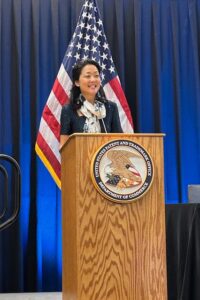
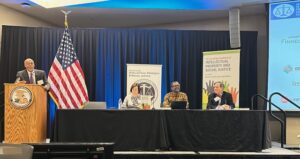
IP Social Justice Lifetime Achievement Award:
The Institute for Intellectual Property and Social Justice honored Patricia Carter Ives Sluby, L.H.D. with a IP Social Justice Lifetime Achievement Award. Dr. Sluby joined the US Patent and Trademark Office as a patent examiner in the early days of the Equal Employment Opportunity program and later achieved the primary status followed by a special programs Patent Cooperation Treaty examiner. Upon leaving the USPTO she became a registered patent agent.
Dr. Sluby began compiling information on African American inventors, including women inventors and published articles in patent office journals and many other national publications including the 1990 Bicentennial Celebration—United States Patent and Copyright Laws Proceedings, Events and Addresses. She self-published her first book in 1987, Creativity and Inventions: The Genius of Afro-Americans and Women in the United States and their Patents. and after retirement published books in 2004, The Inventive Spirit of African Americans, and 2011, The Entrepreneurial Spirit of African American Inventors. Pat herself holds 22 registered copyrights. She is co-curator of the exhibit, Patented Ingenuity: The Art of African American Inventors, at the Prince George’s African American Museum and Cultural Center.
Dr. Sluby is past president of the National Intellectual Property Law Association, educating the minority community in IP, placement of IP professionals, and legislation, and member of the board of directors of the Museum for Black Innovation and Entrepreneurship. She has appeared widely on radio, TV, and internet programs, once serving as the spokesperson for the USPTO on CNN. She has also served as a contributing editor of the journal of the National Society of Black Engineers.
Her distinguished service includes Department of Commerce Science and Technology Fellow, serving on the subcommittee on Domestic Monetary Policy for the U.S. House of Representatives Committee on Banking, Finance, and Urban Affairs where she drafted a bill to place the first woman bank president in the US on a coin and special director in the Office of Cultural Resources of the National Park Service.
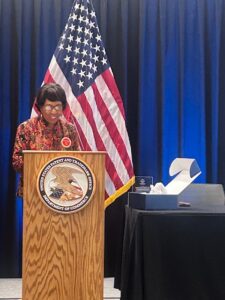
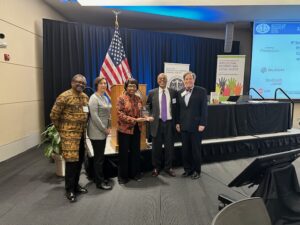
The 2025 CLE Sessions were:
• Key Highlights of 2024: Patent, Trademark, and Copyright
• Donald R. Dunner Judicial Panel
• IP Social Justice in Legal Practice: Preparing Practitioners for Contemporary Challenges
• Trademark, Entertainment, and NIL
• Perspectives on The Rise of Trade Secrets
• Al and Impacts on Patent System Inclusion
• Ethics
View the session video for IP Social Justice in Legal Practice: Preparing Practitioners for Contemporary Challenges here.
Thank you to our sponsors!

![]()
![]()
![]()
![]()



2024 IP & Social Justice CLE Recap
“IIPSJ’s annual conferences played an important role in developing a social justice perspective in intellectual property law and policy. The Institute’s mission is a vital one”- Honorable Raymond T. Chen
For the 21st Annual IP and Social Justice CLE Program, key attendee sessions included our Annual IP Year in Review, Social Justice Luncheon Plenary Sessions: Increasing Diversity in Innovation and HUSL-ing In-house at JPMC, as well as the Annual Donald R. Dunner Judicial Panel, which included insights and reflections from the Honorable Leonard P. Stark, Judge with the United States Court of Appeals for the Federal Circuit, the Honorable Patricia Tolliver Giles, Judge with the United States District Court for the Eastern District of Virginia, the Honorable Scott R. Boalick, Chief Administrative Patent Judge with the Patent Trial and Appeal Board in the U.S. Patent and Trademark Office, and the Honorable Susan G. Braden, Former Chief Judge (ret.) with the United States Court of Federal Claims.
The IP and Social Justice CLE Conference benefits from participation from all demographics within the IP legal community: attorneys in private practice, in-house counsel corporate departments, government agencies, and public interest NGOs, as well as members of the judiciary and government officials.
The IP and Social Justice CLE Program was co-hosted by law firm Finnegan, Henderson, Farabow, Garrett & Dunner LLP, with Finnegan Partner & Chief Diversity and Inclusion Officer Esther H. Lim being presented with the IP Social Justice Lifetime Achievement Award.
The 2024 CLE sessions were:
- Key Highlights of 2023: Patent, Trademark, and Copyright
- Donald R. Dunner Judicial Panel
- Increasing Diversity in Innovation
- HUSL-ing In-house at JPMC
- Inclusive Innovation and Cutting-Edge IP Strategies
- How to Help the Trial Court Judge Understand Patent Law
- Embracing the Future of AI, Cybersecurity, and Privacy
- Updates on College Athletes’ NIL & Celebrities’ Right of Publicity
- Ethics
View the IP and Social Justice CLE session videos here.
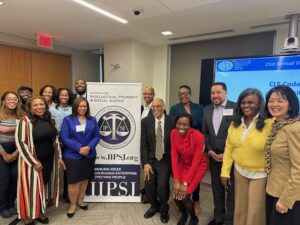
Thank you to our sponsors!
![]()

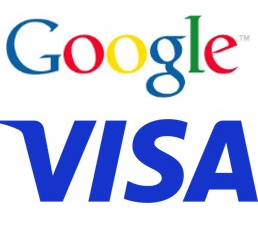
![]()
Blog Post: IIPSJ Attendance at the 65th World Intellectual Property Organization General Assemblies
(WIPO GA) (Geneva, 9-17 July 2024)
By Dr. Metka Potočnik (she/her/hers), Senior Lecturer in Law, Wolverhampton Law School
IIPSJ attended the 65th World Intellectual Property Organization (WIPO) General Assemblies (GA),
in their capacity as the WIPO Accredited Observer. Now attending regularly, IIPSJ participated in the
official hearings at the WIPO Headquarters in Geneva, with the Associate Director for International
Programs, Dr. Metka Potočnik, attending the length of the proceedings in person. These
assemblies brought together another record number of delegates. A full list of participants is
available here, and all the sessions are available for viewing here.
IIPSJ attended the GA sessions for the second time in Geneva, after having observed several WIPO
meetings online, since 2020. IIPSJ continues to take the GA meetings as an opportunity to build
strategic partnerships with Member States and other stakeholders, interested in creating access,
inclusion and empowerment for under-represented creators and innovators in the global eco-
system. IIPSJ contributed to the discussion in writing (see here), and in the session (view here, at
02:31:12).
IIPSJ representative, Dr. Metka Potočnik, also attended the 11th WIPO-NGO Stakeholder Dialogue,
which was organised in parallel with the 65 th WIPO GA and took place on Thursday, 11 July 2024, at the WIPO New Building. WIPO Director General Tang, Deputy Director Edward Kwaka and other WIPO experts met with over sixty Accredited Observers and NGOs, in discussing global challenges, which require a multi-stakeholder response. IIPSJ sent their question in advance, and continued informal conversations with WIPO and several interested stakeholders for the duration of the GA meetings. The event has been placed in the spotlight for its importance, and more can be read here.
IIPSJ is continues to contribute to future discussions in WIPO, with the aim of building a more inclusive WIPO eco-system. The IIPSJ team are working towards a meaningful participation in the 46th Session of the Standing Committee on Copyright and Related Rights (SCCRR) (see here, 2025 dates to be confirmed) and the 33rd Session of the Committee on Development and Intellectual Property (CDIP) (see here). If you are interested in contributing to IIPSJ work in this space, do contact the IIPSJ directly.
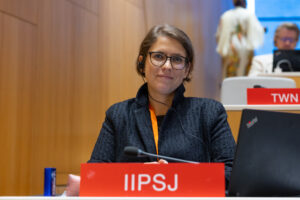
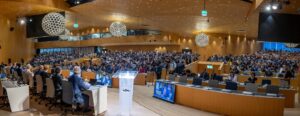
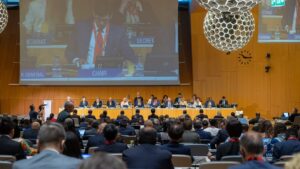
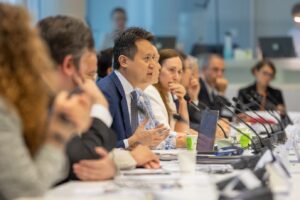
IIPSJ Attendance at the 64th World Intellectual Property Organization General Assemblies
(WIPO GA) (Geneva, 6-14 July 2023)
By Dr. Metka Potočnik (she/her/hers), Senior Lecturer in Law, Wolverhampton Law School
IIPSJ attended the 64th World Intellectual Property Organization (WIPO) General Assemblies (GA), in their capacity as the WIPO Accredited Observer. IIPSJ attended the official hearings at the WIPO Headquarters in Geneva, with the Associate Director for International Programmes, Dr Metka Potočnik, attending the length of the proceedings in person. These assemblies brought together a record number of delegates, with over 1,200 delegates in attendance, which exceeded the pre-Covid numbers of attendance in the General Assemblies. A full list of participants is available here, and all the sessions are available for viewing here.
IIPSJ previously observed several WIPO meetings online and took this GA as an opportunity to create strategic partnerships with Member States and other stakeholders, interested in creating access, inclusion and empowerment for under-represented creators and innovators in the global eco-system. IIPSJ representative attended the 10th WIPO-NGO Stakeholder Dialogue, which was organised in parallel with the 64th WIPO GA and took place on Monday, 10 July 2023, at WIPO New Building. WIPO Director General Tang and other WIPO experts met with over 40 Accredited Observers and NGOs, in discussing important issues, which require a multi-stakeholder response. The event has been placed in the spotlight for its importance, and more can be read here.
IIPSJ is aiming to contribute to the future discussions in WIPO, with the aim of building a more inclusive WIPO eco-system. The IIPSJ team are working towards a meaningful participation in the 44th Session of the Standing Committee on Copyright and Related Rights (SCCRR) (see here) and the 31st Session of the Committee on Development and Intellectual Property (CDIP) (see here). If you are interested in contributing to IIPSJ work in this space, do contact the IIPSJ directly.
Dr Metka Potočnik, IIPSJ Associate Director for International Programmes, Representing IIPSJ at the Opening of the 64th WIPO GA, Thursday, 6 July 2023, WIPO, Geneva, Switzerland Copyright: WIPO. Photo: Emmanuel Berrod. This work is licensed under a Creative Commons Attribution-NonCommercial-NoDerivatives 4.0 International License.
Dr Metka Potočnik in attendance, representing the IIPSJ at the WIPO-NGO Stakeholder Dialogue, at the 64th WIPO GA, Monday, 10 July 2023. WIPO Director General Tang addressing the WIPO NGOs and Accredited Observers. Copyright: WIPO. Photo: Violaine Martin. This work is licensed under a Creative Commons Attribution 4.0 International License.
2023 IP & Social Justice CLE Recap
“IIPSJ’s annual conferences played an important role in developing a social justice perspective in intellectual property law and policy. The Institute’s mission is a vital one”- Honorable Raymond T. Chen
These were some of the key reflections to come out of the 20th Annual Intellectual Property and Social Justice CLE Conference, held on March 3, 2023. The event marked more than two decades of increasing the education surrounding the nexus of intellectual property and social justice as well as broadening the knowledge of intellectual property practitioners across the globe.
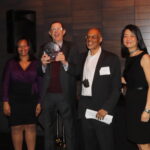
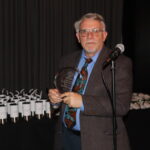 As part of the 20th anniversary, we celebrated the program and Institute founders with awards. IP Social Justice Lifetime Achievement Awards were given to Thomas L. Irving and Steven D. Jamar.
As part of the 20th anniversary, we celebrated the program and Institute founders with awards. IP Social Justice Lifetime Achievement Awards were given to Thomas L. Irving and Steven D. Jamar.
And we honored Professor Lateef Mtima with an award as well that read:
Presented to Lateef Mtima 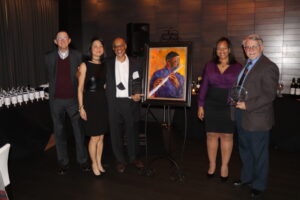
In recognition of your unwavering commitment to increasing diversity in intellectual property law and guiding the next generation of attorneys especially those from historically black colleges and universities
In appreciation of your contributions to the field of intellectual property law through your superior and thought-provoking authorship on the topic of intellectual property and social justice
In acknowledgement of your ongoing service to the intellectual property legal community through your teachings as a renowned lecturer and leadership as founder of the Institute for Intellectual Property and Social Justice.
For the CLE program, key attendee sessions included our annual IP Year in Review, social justice luncheon sessions: Unleashing American Innovation Act and Highlights from the Innovator Diversity Pilots Conference, as well as the annual Donald R. Dunner Judicial Panel, 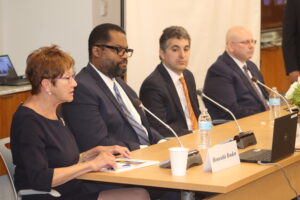 which included insights and reflections from the Honorable Leonard P. Stark, Judge with the United States Court of Appeals for the Federal Circuit, the Honorable Scott R. Boalick, Chief Administrative Patent Judge with the Patent Trial and Appeal Board in the U.S. Patent and Trademark Office, the Honorable Bryan F. Moore, Administrative Law Judge with the United States International Trade Commission, and the Honorable Susan G. Braden, Former Chief Judge (ret.) with the United States Court of Federal Claims.
which included insights and reflections from the Honorable Leonard P. Stark, Judge with the United States Court of Appeals for the Federal Circuit, the Honorable Scott R. Boalick, Chief Administrative Patent Judge with the Patent Trial and Appeal Board in the U.S. Patent and Trademark Office, the Honorable Bryan F. Moore, Administrative Law Judge with the United States International Trade Commission, and the Honorable Susan G. Braden, Former Chief Judge (ret.) with the United States Court of Federal Claims.
The IP and Social Justice CLE Conference benefits from participation from all demographics within the IP legal community: attorneys in private practice, in-house counsel corporate departments, government agencies, and public interest NGOs, as well as members of the judiciary and government officials. In addition to the keynote sessions, this year’s breakout sessions included networking and discussions with counsel from Meta, Under Armour, J.P. Morgan, 3M Company, Freddie Mac, Visa and Pall Corporation, affording many the opportunity to gauge the current climate on the field in terms of fair use, trade secrets, and adding value as in-house counsel.
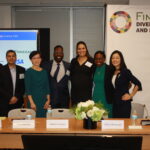
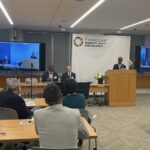

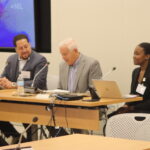
Year after year, the mantra of the conference remains the same – to expand the opportunities for minority attorneys to pursue careers and distinguish themselves in the field of intellectual property law. The Conference’s core objectives include:
● Educating minority and other IP attorneys on current developments in the law in an environment that highlights the social justice obligations of IP law.
● Providing minority and other attorneys in government, civil rights, public interest, and/or non-profit practice a free/nominal fee opportunity to develop IP practice skills.
● Providing an opportunity for experienced minority IP lawyers to demonstrate their expertise in the field to audiences they might not otherwise reach, while offering professional networking opportunities for minority and other IP attorneys.
Studies continue to confirm that African Americans and other minorities are severely underrepresented in intellectual property legal practice, notwithstanding the important contributions these communities make to intellectual property production and use in our society. Contributions from participants and speakers alike have enhanced the significance of the conference as the only intellectual property CLE program of its kind. Erika H. Arner, Managing Partner of Finnegan, Henderson, Farabow, Garrett & Dunner, LLP said, “Now more than ever we need organizations like IIPSJ, taking concrete and impactful actions to advance social justice and IP.”
The 2023 CLE sessions were:
- IP Law Year in Review – Trademark, Patent, and Copyright
- Donald R. Dunner Judicial Panel
- Highlights from the Innovator Diversity Pilots Conference
- Unleashing American Innovation Act
- Leading with IP and Adding Value to Corporations
- How Fair Is Fair Use? A Discussion About Andy Warhol Foundation v. Goldsmith
- In House Counsel Discussion on Trade Secret Law
- Updates on College Athletes NIL & Celebrities Right of Publicity
- Ethics
View the full list of videos here.
Thank you to our sponsors!
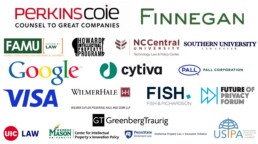
2023 HBCU IP & Tech Law Summit Recap
On March 2, 2023, IIPSJ, co-host Perkins Coie, and several sponsors, hosted the 5th Annual Microsoft Technology Summit to provide a comprehensive “diversity pipeline” experience for law students. During the Technology Summit, law students learned about new opportunities in intellectual property(IP) and technology law and policy practice.
Acting Principal Deputy National Cyber Director of the Office of the National Cyber Director Kemba Eneas Walden delivered the keynote speech to attendees alongside Founder of the HBCU IP & Tech Law Summit Charlie Bingham for a fireside chat. Acting Director Walden recounted her journey to her current role as a Hampton University graduate and addressed issues of cybersecurity that her office plans to handle as a result of President Joe Biden’s newest initiative.
The Summit consists of two key components: a full day of student-focused IP and technology law updates with networking and recognition of student academic and extracurricular achievement in these fields, including the presentation of “micro” scholarship awards paid directly to students. This year, the following were recipients of awards:
- D&I in Tech Ally Award
- Cameron Benton, NCCU
- Tech Law Policy Achievement Award
- Kayla Mitchell, 3L NCCU
- Samuel Cadet, HUSL
- Outstanding Achievement in IP Social Justice Award
- Daria Fogan, HUSL
- DeNashia Robinson, HUSL
- Brianna George, NCCU
- The IP & Tech Law Summit IP Social Engineer Award
- Michee Jacobs, HUSL
- Askhari Little, HUSL
- Tyrrell Ufot, NCCU
- The IP & Tech Law Summit IP Achievement Award
- Leandre’a Scott, NCCU
While the Summit was initially established for Howard Law students, it has since been expanded to include students at four historically black colleges and university law schools. In 2022 a pilot initiative was added to expand the scope of the program to assist students in finding internship opportunities in IP practice, and to provide internship stipends where the internships secured are uncompensated.
Some of the subjects covered during the event included data privacy, cryptocurrency, and blockchain and were presented by experts in the intellectual property field including executives from Uber, Perkins Cole, and Reed Smith hosting sessions such as:
- The Impact of Innovative Technologies on Society and the Practice of Law
- The Impact of Cryptocurrency and Blockchain on Society and the Practice of Law
- Paying it Forward: A Day in the Life of a Tech Lawyer
Find the full list of videos here.
Thank you to our sponsors!

Blog Post On Likeness Legislation
Recent Name/Image/Likeness Legislation Will Change the NCAA (or Not)
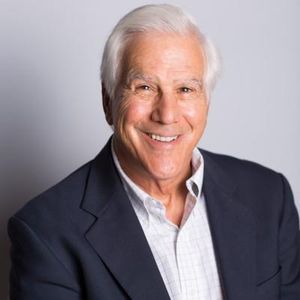 by Ronald S. Katz
by Ronald S. Katz
INTRODUCTION
In a list of organizations creating inequities, the National Collegiate Athletic Association would certainly be included. For example, like professional sports, the NCAA is a multi-billion-dollar enterprise, but, unlike professional sports, it pays only a minuscule percentage of its revenues to its athletes, mainly in the form of athletic scholarships. In the field of intellectual property, those players have not been allowed to receive payments for their names, images and likenesses, even though every other student on campus has that right.
To remedy this latter injustice, California in September 2019 passed the Fair Pay to Play Act, allowing athletes rights regarding their names, images and likenesses similar to those enjoyed by all other students. Numerous other states are considering NIL legislation similar to California’s.
Because college sports receive much public attention, the California law, which does not come into effect until 2023, has generated numerous opinions about its potential effect. The extremes of those opinions range from those who say that the law will end intercollegiate sport as we know it to those who say that the law will have no effect. The NCAA has now also weighed in, stating, opaquely, that it will at some unknown point “permit” college athletes “the opportunity to benefit” from their name/image/likeness “in a manner consistent with the collegiate model.”
In fact, at this juncture, no one can really say what the effect, if any, of the law will be. That point was driven home by an order rendered on January 6, 2020, by the federal appellate court with jurisdiction over California, the Ninth Circuit Court of Appeals. Pursuant to that order, in the pending appeal (No. 19-15566) of In re: National Collegiate Athletic Association Athletic Grant-in-Aid Cap Antitrust Litigation, a case concerning the payment of college athletes, “The parties are directed to file…briefs…on the impact, if any, of California’s Fair Pay to Play Act…on this case.”
If the judges of the Ninth Circuit do not yet know the effect of the NIL law, it is fair to say that no one else does either. In my opinion, the best that can be done at this point, as below, is to put the law into context by triangulating among the extreme opinions noted above and the NCAA’s position on the Fair Pay to Play Act.
EXTREME OPINION #1: NIL LEGISLATION WILL END INTERCOLLEGIATE SPORT AS WE KNOW IT
There is logic supporting this view. For example, there is no difference in economic effect if an athlete receives from an alumni booster of a university $10,000 under the table, which violates NCAA rules; $10,000 in salary, which violates NCAA rules; or $10,000 for name, image or likeness, which would be legal under the Fair Pay to Play Act and, possibly, under new NCAA regulations. Because money is fungible, it really does not matter, in an economic sense, for what reason it is purportedly paid. Therefore, payment for names, images and/or likenesses can completely undermine the NCAA principle that athletes should not be paid. The amounts paid, in theory, could be virtually unlimited.
EXTREME OPINION #2: NIL LEGISLATION WILL HAVE NO EFFECT
This extreme view has support in the law. Under the Commerce Clause of the U.S. Constitution, states cannot make laws that regulate interstate commerce, and intercollegiate sports clearly constitute interstate commerce, viz., the NATIONAL Collegiate Athletic Association. Indeed, a case decided by the Ninth Circuit Court of Appeals in 1993 (NCAA v. Miller, 10 F.3d 633) applied this principle to intercollegiate sports.
In that case, Nevada made a law that would have caused NCAA disciplinary proceedings to have rules in Nevada different from those that the NCAA applied nationally. Like the Fair Pay to Play Act, the Nevada law had been emulated in other states.
The court did not hesitate to invalidate the Nevada statute on the ground that it regulated interstate commerce in violation of the U.S. Constitution: “The statute directly regulates interstate commerce and runs afoul of the Commerce Clause both because it regulates a product in interstate commerce beyond Nevada’s state boundaries, and because it puts the NCAA…in jeopardy of being subjected to inconsistent legislation arising from the injection of Nevada’s regulatory scheme into the jurisdiction of other states.” It is difficult, if not impossible, to distinguish the judicial reasoning applied to this Nevada legislation from the judicial reasoning that would be applied to California’s Fair Pay to Play Act.
THE NCAA’S OPAQUE PRONOUNCEMENT
As noted above, in October, 2019, after the California law passed, the NCAA issued a vague statement to the effect that It will study how college athletes may be paid for their names, images and/or likenesses “in a manner consistent with the collegiate model” at some unstated point in time. One problem with the NCAA’s statement is that the collegiate model is nowhere clearly defined.
Underscoring that fundamental problem is that the District Court decision being considered in the Ninth Circuit order mentioned above (In re Nat’l Collegiate Athletic Ass’n Athletic Grant-in Aid Cap Antitrust Litig., No. 14-MD-02541 CW, 2019 WL 1747780, (N.D. Cal. Mar. 8, 2019)) concluded that the NCAA rules “that permit, limit, or forbid student-athlete compensation and benefits do not follow any coherent definition of amateurism,” which is the core principle of the NCAA. This finding was based, among other things, on inconsistent definitions of amateurism given by different NCAA witnesses and on the fact that at trial, according to the court’s opinion, there was evidence of seventeen different ways-such as payment for post season bowl or championship play–that the NCAA permits athletes to be compensated.
Thus, whatever the NCAA’s definition of an amateur is, it does not comport with the dictionary definition: “a person who engages in a study, sport or other activity for pleasure rather than for financial benefit or professional reasons.” Given the above, it is difficult to divine how the NCAA will create a system of payment for athlete names, images and likenesses “consistent with the collegiate model.” It should be noted that payment for the names, images and/or likenesses of athletes rarely have a connection to education.
CONCLUSION
Intellectual property injustice is a symptom of the NCAA’s underlying problem, and the Fair Pay to Play Act is a reaction to that symptom. The fundamental problem of the NCAA is that its top levels are indistinguishable from professional sports, and the theory of amateurism-however that is defined–does not work in that context. Whether the Fair Pay to Play Act survives or not, the pressure will continue to bring the regulation of college sport in line with its reality.
Ronald S. Katz is a Senior Counsel at GCA Law Partners LLP. A co-author of Sport, Ethics and Leadership, he will be speaking on the subject covered above at the 2020 IP and Social Justice CLE this coming February 28.

